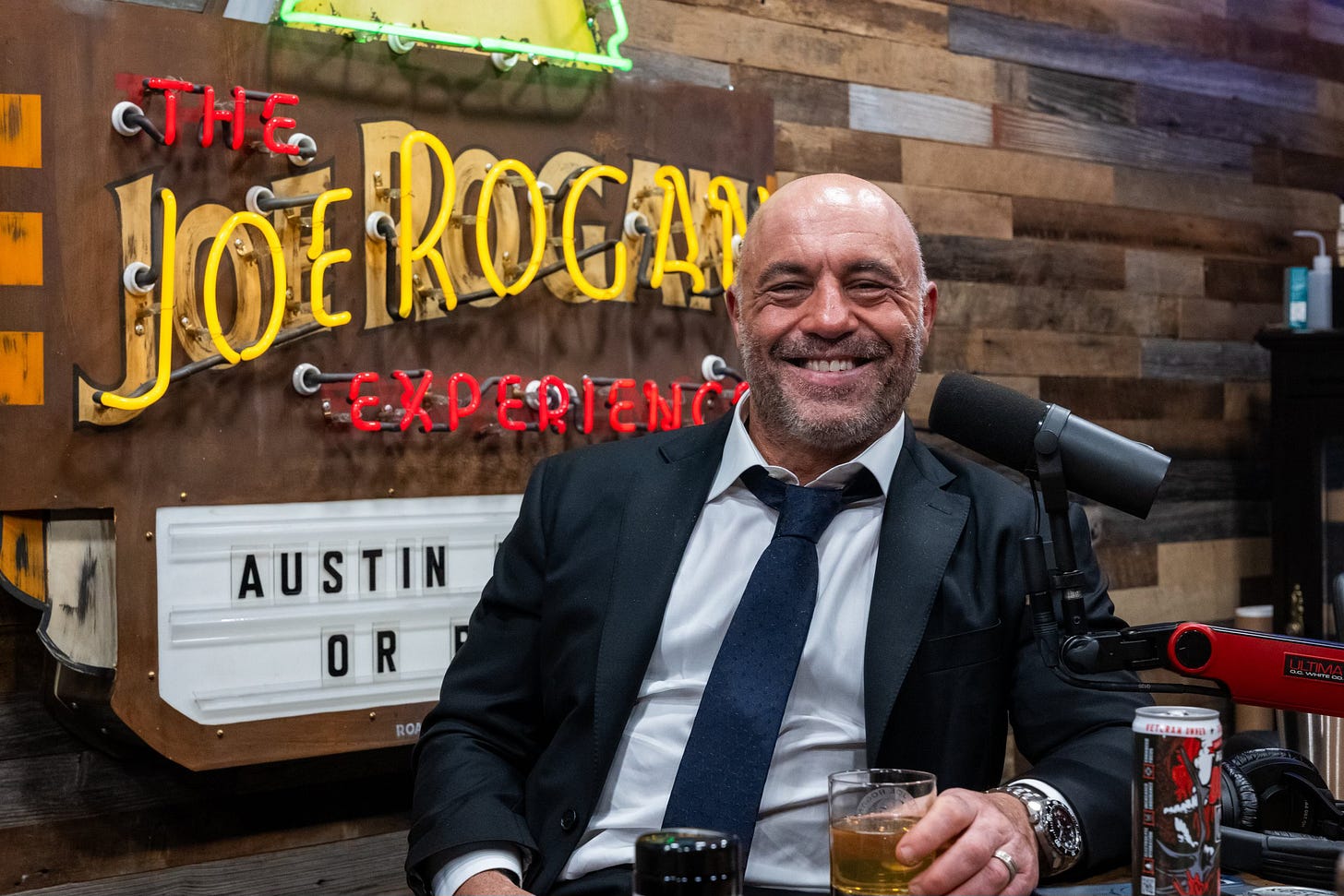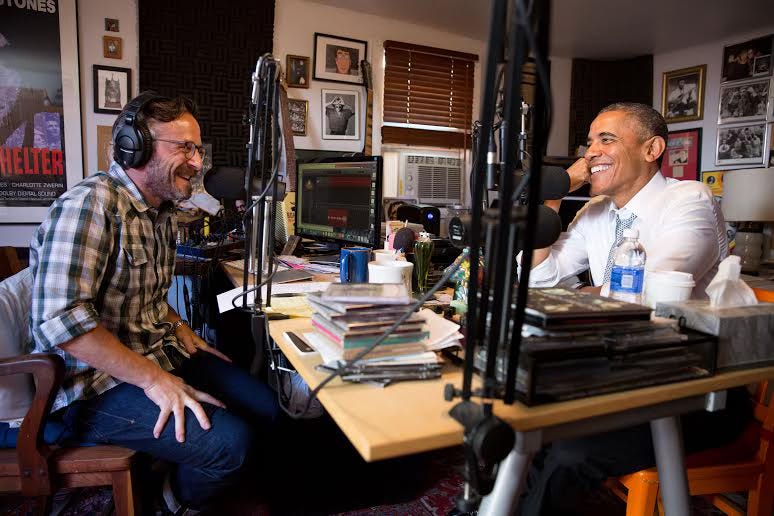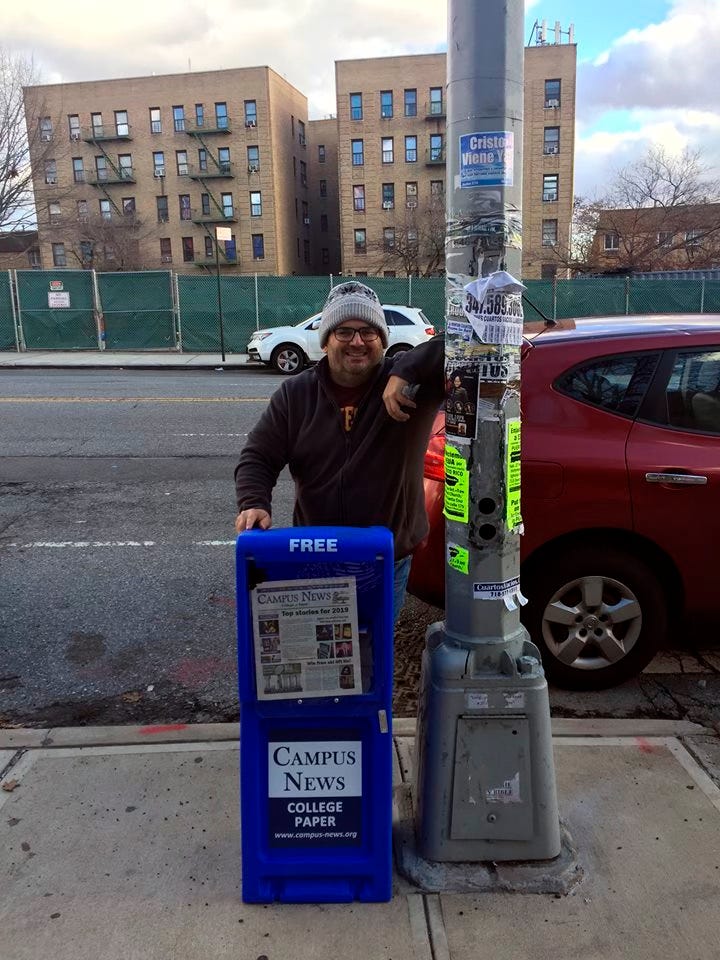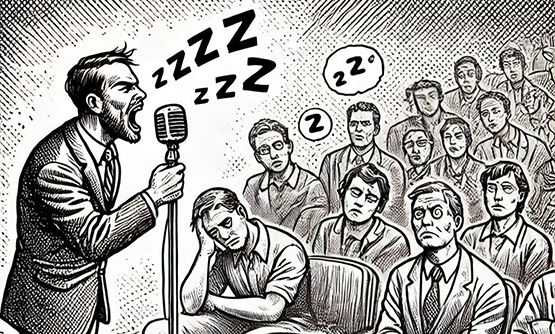By Darren Johnson
Campus News
I spend a lot of time driving around, and walking dogs, so have a good deal of time to listen to podcasts.
As do many people, apparently, because analysts note how powerful podcasts were during the 2024 presidential election. Donald Trump did well in that sphere; and some pundits are saying 2024 will go down in history as the year when traditional media — compared to new media (like podcasts and social media) — became insignificant in swaying public opinion.
The days of someone like Kennedy beating Nixon in a standard TV debate and then, with that mojo, going on to win the presidency, are over.
Because it was clear that Kamala Harris “won” the one TV debate the two candidates did, but Trump went on the country’s No. 1 podcast, “The Joe Rogan Experience,” and came off as more three-dimensional for three hours, while the Harris team couldn’t manage to get her to appear on the show. Rogan had invited both candidates.
Harris was operating under the older paradigm of tightly controlled PR, working with very structured mainstream media, while the better podcasts are more freeform.
(I’d venture to say traditional PR strategy may be dead, too.)
But many Democratic strategists are still in the traditional media mindset, it seems, because a common refrain out there is: “We need a Democratic Joe Rogan.”

Their assumption is that Rogan has a conservative podcast, and thus it could be countered with a liberal podcast.
First off, the assumption is wrong. Most of Rogan’s shows are not political at all — they veer more into the “Coast to Coast” realm. That was a popular nightly syndicated AM radio show back in the day, hosted by the late Art Bell, that dealt with the paranormal, UFOs and such. (I guess the show still exists, with a new host, but who listens to traditional radio late at night anymore?)
Rogan has that type of content, but he also interviews war heroes, rappers, sports stars, and more. He’s a tastemaker. Thus he has built up a huge audience.
If I had to tag him with an ideology — while he did stump for Trump a good deal this past year, and perhaps is tied too closely to big money oligarchs like Elon Musk — I’d say it’s “rugged individualism.”
He talks a lot about his personal growth through physical martial arts training, hunting, the outdoors, etc. He’s also a standup comedian who had a good deal of TV success. One could say he has a winning attitude that many people would like to have themselves.
Some detractors say his is a “Bro” podcast and disproportionately attracts white males. What about everyone else?
But if there were to be a Democratic Joe Rogan, would he really want to abdicate people who admire rugged individualism? Why not include some of them — and everybody else? The so-called Big Tent.
Podcasts Can Be Messy, Chaotic
The Democrats have tried to counter the popularity of conservative radio in the past. There’s an interesting “Journalism History” podcast episode on why past radio efforts by Democrats like Mario Cuomo, Gary Hart and Ed Koch failed to capture the mainstream’s imagination. In short, Cuomo and Hart were stuffy bores and Koch was just too regional.
(Some cynics on the right say that liberal radio did succeed — it’s called NPR/Public Radio. But wasn’t a popular radio show in that realm called “Car Talk,” hosted by a couple of tough-talking mechanics and decidedly blue collar? Maybe that suggests that the left can accept rugged individualists? Though that show ended in 2012.)

Is There a “Democratic Joe Rogan” now?
They want someone with a big personality with a big studio with that big sound the big podcasts get. In short, not small.
During the recent holiday week, as I listened to some big podcasts, I think I was reacquainted with the “Democratic Joe Rogan.”
Many of the big podcasters take that week off and play repeats, but Marc Maron’s “WTF Podcast” did put out a new show, and instead of Maron interviewing his usual A-list and B-list celebrities (he’s in Southern California, and that’s the podcast ecosystem there), he did a solo Q&A show that revealed his personality a bit more.
Maron is a bigger and better standup comedian than Rogan, also has had some notable TV and movie success, and was one of the voices of the failed Democratic radio response to the explosive growth of conservative pundit radio hosts like Rush Limbaugh called “Air America Radio Network,” which ended in 2010. He has the bona fides.
Maron’s podcast was once one of the most highly rated. Even Barack Obama visited Maron’s garage studio. Now it’s no longer on the list of most-popular podcasts.
Format Change Needed
The problem with celebrity interviews is celebrities live a more charmed life than us. We have dreams, too, but less realized, and the psychic result of such interviews is they make you feel small. Who wants to feel that way?
While if Rogan interviews more of an unknown, that person is more relatable to us listeners. Because we’re unknowns. (But, all together, we have power.)
(Old-school “fighting” liberals used to interview everyday people last century; think Studs Terkel or Jimmy Breslin.)
Maron starts his podcast with a monologue, but still intersperses in low-quality affiliate ads, making it hard for the listener to maintain focus on what he’s saying.
Maybe Maron is too individualistic to allow his podcast to become a Democratic springboard, but maybe the fault also lies with current, rigid Democratic leadership thinking they wouldn’t support someone who isn’t perfectly aligned with them.
It’s that free speech problem.
But is Rogan perfectly aligned with the Republicans? Hardly.
They say that perfect is the enemy of the good. A good show won’t be perfect, but a “perfect” show will seem disingenuous to us listeners.
How to Make Maron’s Show Great Again
If the Democrats want their Joe Rogan, they already have him.
Steer some better ads to the show so Maron doesn’t have to do those horrible, disjointed ad reads during his monologue, give him some leeway if he has a few thoughts that aren’t aligned with the party platform, and send him some more substantial guests who aren’t merely celebrities trying to sell a movie, album or book.
No spin, more reality.
Or if Maron doesn’t want to be that person, maybe look for somebody else with his bona fides and popular support.
But it takes an open mind to develop a powerful podcast. The listeners aren’t stupid, and they are highly influential to the people in their lives, many of whom don’t listen to podcasts. Reach one podcast listener and you’re probably really reaching several people who converse with that listener, repeating the “facts” he’d heard on that podcast, over coffee or beer.
I’ve made a career in the mainstream media. In newspaper newsrooms, we’re told to write at a level that a fourth grader could understand. That would make us accessible to the masses — the ones who are stronger readers will still stay with us, but the less fluent readers will also feel welcomed — thus the term mass media.
Many argue that mass media is dead, and niche media, like podcasts, is where it’s at, and the biggest podcasts in the niche essentially become influential at a mass-media level.
But it’s messy making a popular show in any genre, and maybe the Democrats don’t want that mess just yet. Take the safe and stuffy route — on his radio show, Gary Hart revealed nothing about his personal life — which we all know was interesting! Give us the tea, Gary!
Letting down one’s guard, and the formalities of 20th century mass media communication, is how the Democratic Party can win elections again.

Darren Johnson runs The Greenwich Journal, The Salem Press and Campus News independent newspapers and is a full-time journalism instructor who handles both the school newspaper and radio station. He studies both newspaper and radio history.








Facebook Comments